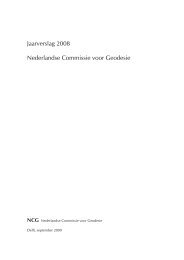SDI Convergence - Nederlandse Commissie voor Geodesie - KNAW
SDI Convergence - Nederlandse Commissie voor Geodesie - KNAW
SDI Convergence - Nederlandse Commissie voor Geodesie - KNAW
Create successful ePaper yourself
Turn your PDF publications into a flip-book with our unique Google optimized e-Paper software.
5. DISCUSSION AND IMPLICATIONS FOR THEORY AND PRACTICE<br />
This analysis of local governments examined their capacity, characteristics and outcomes<br />
of the data sharing partnerships in the states of Queensland, Victoria and Tasmania.<br />
A number of significant trends and differences were identified amongst the variables<br />
and across the three states. The initial analysis of the questionnaire data has<br />
identified a number of important characteristics of local governments including their capacity<br />
across a number of the identified <strong>SDI</strong> component areas, existing preferences for<br />
collaboration and their level of satisfaction with the existing data sharing partnerships.<br />
The organisational analysis identified that the ICT capacity of LGAs was significantly<br />
better than expected and management support for GIS was generally satisfactory.<br />
Policies on access and pricing are not well developed in local government, as small<br />
staff numbers and other activities take priority. It is therefore important that state government<br />
agencies continue to lead and support LGAs to develop their policy frameworks.<br />
LGAs appear more likely to adopt or mimic the state government policies on access<br />
and pricing, although this has not been proven conclusively.<br />
The findings from the factor analysis underscore the key motivations for sharing of<br />
data, particularly at the local government level. LGAs are very tightly resourced and<br />
highly business driven. Therefore, the linkage of data sharing initiatives to the business<br />
processes of LGAs is more likely to result in more successful and sustainable outcomes.<br />
The research also indicates that policies at that state and local level should be<br />
aligned where possible to ensure that there is minimal conflict. Local governments are<br />
more likely to follow the lead of state agencies on policy development due to their limited<br />
capacity to develop their own specific spatial data access and pricing policies.<br />
Often, LGAs are at the cutting edge of spatial data access and provision through the<br />
use of the internet and web mapping. Because of the closeness of LGAs to their customers,<br />
they see immediate and significant benefits through providing information access<br />
to the local community. Information access facilitates better service and evidence<br />
indicates that it reduces the number of general enquiries. Organisational support and<br />
leadership were also rated highly and agree with previous theoretical and empirical research.<br />
Local government data is increasingly available over the web and indications are that it<br />
will be a strong driver for facilitating business and reducing the number of over-thecounter<br />
enquiries for LGAs. The level of completeness of core data sets was very high<br />
for most local governments which should provide an excellent basis for exchanging<br />
digital data. Standards and metadata were identified as issues that will continue to demand<br />
attention and strategies to improve compliance in these areas. Integration of data<br />
across the LGAs is well advanced, but full interoperability is still some way off.<br />
6. CONCLUSIONS<br />
Spatial data is widely utilised across all levels of government, business and the general<br />
community. The objectives of <strong>SDI</strong> initiatives are to create, maintain and disseminate<br />
spatial data for the benefit of society. However, the co-operation and exchange of information<br />
has continued to be problematic with detrimental impacts on government<br />
business and areas such as emergency services. This research has found that local<br />
governments have mature spatial data holdings and the ICT infrastructure to facilitate<br />
<strong>SDI</strong> development through the wider sharing of data.<br />
214

















